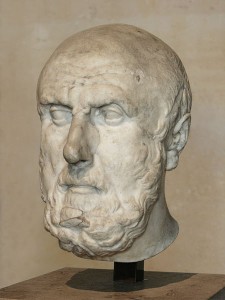The
ancient Greek philosopher Chrysippus was born circa 280 BC in Soli, Cilicia,
Asia Minor, which is present day Soli, Turkey, and died 206 BC in Athens,
Greece. An incredibly fast writer, he is credited with writing approximately
705 books. He is a also credited with many advancements in the philosophical
and logical world.
Chrysippus
was a man of many first and is considered a cofounder of Stoicism and was one
of the first philosophers to categorize propositional logic as an intellectual
discipline, which allowed major advances in the math and science fields. His
propositional logic was developed as an alternative logic to that of Aristotle.
He is believed to have coined the term “disjunction,” which is an operation on two
logical values (two propositions) and only is false if both operands are false.
He also believed that the impossible does not follow from the possible. An old
saying is that “if there had been no Chrysippus, there would have been no
Stoicism.”
In his studies
of physics, he had distinct views on “whole” and “all,” otherwise known as
“universe.” He believed that “whole” is the world and “all” and the “universe”
is the external void plus the world. He also believed that in order to
differentiate between good and evil and formulate a personal set of ethics, one
must have an extensive knowledge of physics and logic.
In
mathematics, Chrysippus contributed to making “one” a number. Until that point,
one had not been considered a number, due to the fact that many believed that
there was no reason to have a number for a single object. From my
understanding, one was the original zero. Chrysippus claimed that “one” was
“multitude one;” however, many saw this as a contradiction, such as Iamblichus.
Chrysippus
was a teacher who taught because he enjoyed helping others learn. He was poor
throughout his life.
Of his
seven hundred and five texts, none of them remain today. He adopted a style
popular to the area where he was from, Soli. He even though he wrote poorly and
awkwardly, he still managed to write approximately ten books a year if you
assume that he began writing advanced intellectual texts as soon as he was born.
Chrysippus
is reported to have a strange, humorous death. In the writings of Diogenes
Laertius, Chrysippus reportedly died while watching a donkey eating figs. He
exclaimed “now give the donkey pure wine to wash down the figs!” After this, he
fell to the ground from laughing so hard and then began having a seizure.
Several people around tried to help him, but it was no use. Authorities claimed
he died from laughter and even though this claim was hard to believe, the
public accepted this explanation; on the contrary of his own writings, Diogenes
also wrote that it was highly unlikely that Chrysippus died from laughter. He
claims that Chrysippus likely died from alcohol poisoning after drinking too
much undiluted wine at an Olympic feast.
Quiz
1. Where was Chrysippus born?
2. What type of logic did he develop and who did it oppose?
3. Are any of his works still around today?
4. How did he really die?
Discussion Questions
1. Do you think that one should be a number? Why or why not?
2. How different do you believe math would be without the number one?
Sources:
I
commented on:

"He also believed that the impossible does not follow from the possible." I hope everyone believes that!
ReplyDelete"An old saying is that “if there had been no Chrysippus, there would have been no Stoicism.” A stoic's stoic, as the old cartoon had it...
"in order to differentiate between good and evil and formulate a personal set of ethics, one must have an extensive knowledge of physics and logic" - pretty sure he was wrong about that, we all know good people who lack such knowledge...
If he'd not invented 1, I'm sure someone would have. Still, where would we be without it? We'd be without digital computing, for one thing.
His demise is a great story, worthy of Critchley's "Book of Dead Philosophers"... but I have to side with Diogenes on this one. But alas, as the stoics say, there's nothing we can do about it.